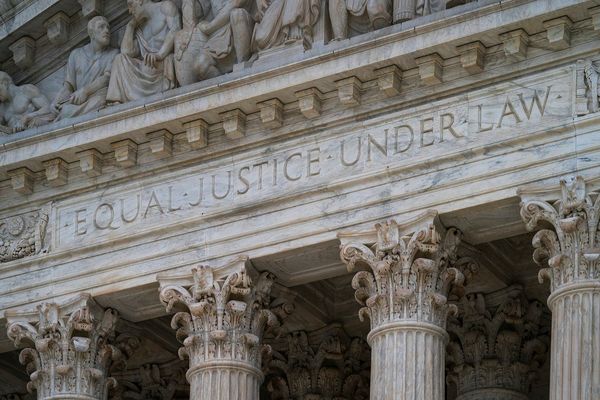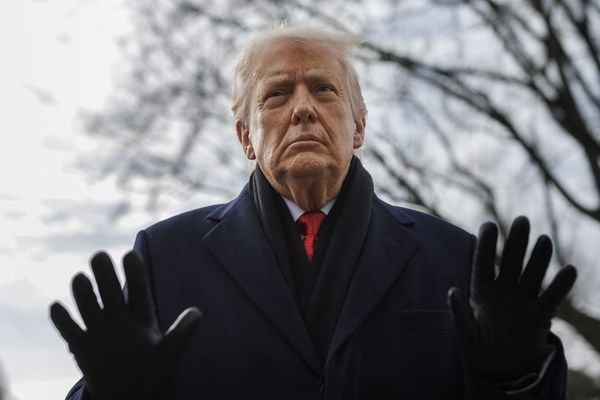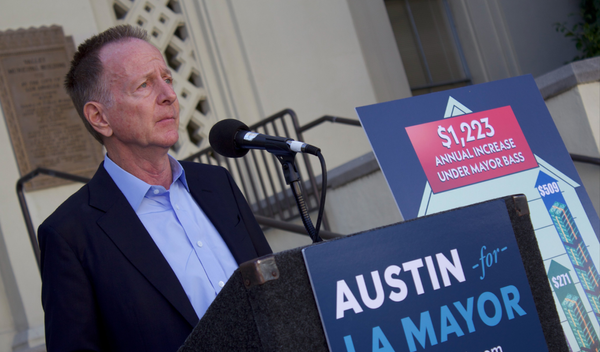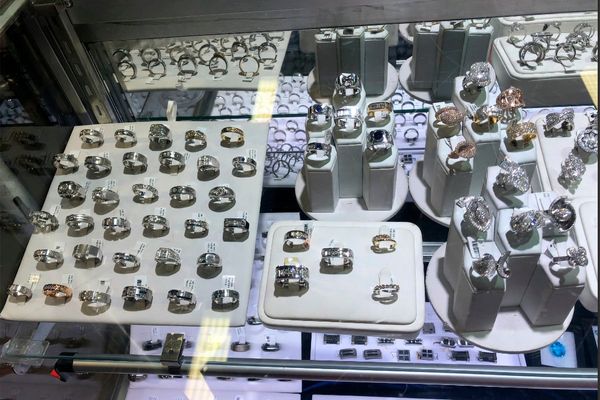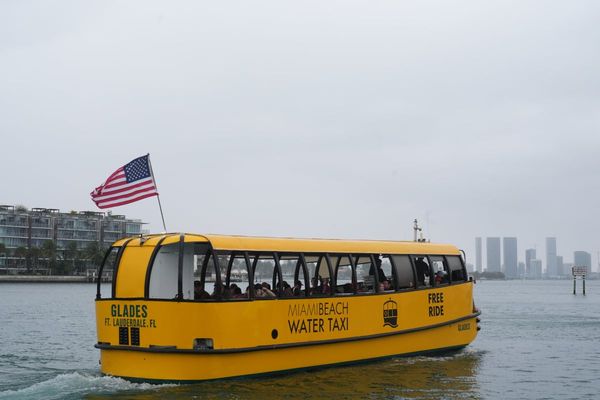Juan Ciscomani remembers walking the halls of the Capitol as a summer intern in 2003. Now a congressman himself, he feels a connection with his late boss.
“If you think about it, Ed Pastor was the first Hispanic member of Congress from Arizona. I’m the first Mexican immigrant,” Ciscomani says.
After a fellowship with another Democratic member, Loretta Sanchez, he served as a senior adviser to a politician of his own party, Doug Ducey, then the Republican governor of Arizona.
Working for Democrats “challenged my own thinking and then really solidified where I stood politically,” Ciscomani says. And his time as a staffer still shapes his approach.
“I know all the work that gets done behind the scenes, so I have high appreciation for the team,” he says. “But I also have high expectations because I’ve done it all. I’ve had to miss Super Bowls. I’ve had to miss family time. I’ve had to miss kids’ activities at school. So when I talk to my team, I’m like, ‘Hey, I know what it’s like. And I also know it’s possible.’”
Ciscomani sat down with Roll Call to talk about all the “full-circle moments” he’s noticed during his freshman term. This interview has been edited and condensed.
Q: What did your typical day look like when you first started out on the Hill?
A: As an intern, I did what you would expect. I made a lot of the copies, I was at the front desk answering the phone. I got to follow Congressman Pastor to a couple of meetings.
He was the first Hispanic member of Congress from Arizona, so it was very meaningful to a kid like me. When my mom visited, he walked us around for a tour of the Capitol and showed us some statues. We rode in the members’ elevator.
My mom still remembers that, because he took the time. He was someone who would always do that. I was here for I think eight weeks total, so I didn’t expect a lot from him — I was an intern.
Q: You came back a couple years later for another program with the Congressional Hispanic Caucus Institute, a longer fellowship this time.
A: It was interesting, because the way the program works, the members [who accept fellows] are usually part of the Congressional Hispanic Caucus. So as a Republican, there weren’t many options there for me to do the fellowship with a Republican.
Loretta Sanchez was a Blue Dog Democrat, and I got to work on her banking and finance issues, and also on Hispanic outreach. She had her chief of staff in the district, and I thought that was very interesting. She was one of the few people I saw do that. So my own chief of staff now, Becky Freeman, [is based] back at home.
Q: Pastor was a progressive, Sanchez was a Blue Dog, and you’re obviously a Republican. Was it strange to work for Democrats?
A: You know, it’s very similar to what I’ve done my entire career. When [Republican Gov.] Doug Ducey hired me to be director of southern Arizona, he said, “Is there any room you feel uncomfortable in? Because I want you to go everywhere, not just the Republican rooms.” And I remember I told him, “Sir, I’m a first-generation immigrant, a Hispanic Republican who grew up in Pima County, the most liberal county in the state. Any room I walk into, there’s a little bit of discomfort, because people expect me to be a certain party.” But I always learned to find common ground.
It challenged a lot of what I believed, and quite honestly it just solidified what I believed, because I had to dig deeper in it. I wasn’t just surrounded by people I agree with all the time. And that’s why caucuses like the Problems Solvers are good, because you find respectful ways to disagree with people. I can see everyone around that table always grasping for common ground.
Q: Where did you live and what did you eat as a fellow? Did you have to take a second job, or was the stipend from CHCI enough?
A: I lived right by Catholic University on the red line, and I had a roommate. We were in the basement, and it would flood every time it rained. You would have to get your stuff up on the bed. Our landlord had an attic, and we would just move into the attic until it drained out.
We all had credit cards, and it was tight. But the stipend covered pretty much all of it. And the program did a really good job of getting you into all these receptions, and that really helped with food. Wherever there was food, fellows were there and we were grubbing.
You know who had the best parties? Jim Kolbe. He was actually from my district, and he had a beautiful home, and just the best chocolate. I don’t drink, but he would make margaritas for everyone.
Q: What did you take away from your early days on the Hill?
A: I actually ran into [Sanchez’s former legislative director recently]. I had one of my fundraisers here in town, and I walked in, and I’m like, I haven’t seen him in almost 20 years.
I got to know the staff very well, and I saw the importance of the relationship between staff in the district and in D.C., and how when communication breaks down, that could probably cause a lot of issues. It’s important for the district team to know the D.C. team works till 9, 10 p.m. — it’s not uncommon for that to happen. But the district team is on every single weekend, because of events at night, Sunday brunches, or whatever. So each team makes a lot of sacrifices.
When you come here on a fellowship right after you graduate, you don’t know what your next step is. And I actually didn’t do any of the traditional ones, like go to grad school or stay in D.C. I went back to my hometown with one goal, which was to get married and start a family.
Q: You met your future wife during the fellowship. Was it love at first sight?
A: I walk out of the kitchen holding a bagel for orientation. It was the first day of CHCI, Aug. 29, about 8:55 a.m. — I remember the day. I look over to the right, and I see Laura coming down the hallway. A month later, I proposed. I was crazy enough to propose, and she was crazy enough to say yes. And here we are, six kids later.
We were out there playing a coed flag football game during week two or three, and Laura was on the other team. She was playing really rough, to the point that another girl was like, “I don’t want to play anymore. She’s too rough.” I’m like, let’s see how Laura reacts to this. She starts jogging backward and — I’ll never forget this — tightens her ponytail. She’s like, “If you can’t take it, get the heck off the field.” And I was like, “I’m gonna marry that girl.”
Q: What advice would you give to someone starting out who wants to make it to Congress?
A: If you want to be in public office at some point, first go live life. Go and start a business, get a job, raise a family. That’s what I chose to do.
Go live life, go fight for something. And now I have these full-circle moments, right? The first time I was here on the Hill in 2003, I was still a permanent resident. I wasn’t a citizen yet, so I had a green card. I came back in 2023, and now I have a green pin.
Back when I got to walk my mom around the Capitol with Ed Pastor, I thought I owned the place. I was just so proud, and my mom was so proud of me. Here’s an immigrant family, and now the son is interning on the Hill. It felt like the peak of our life. Just like, “Wow, this is why we came. The American Dream has been achieved.” And here we are now, and I’m walking her around as a member of Congress.
The post From green card to green pin: Rep. Juan Ciscomani sees ‘full-circle moments’ appeared first on Roll Call.
